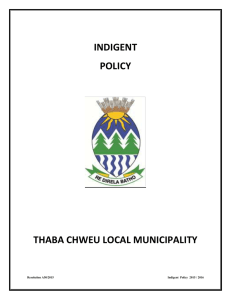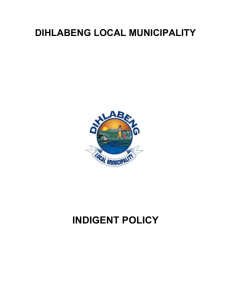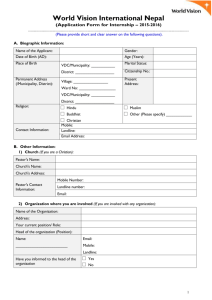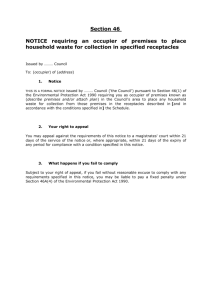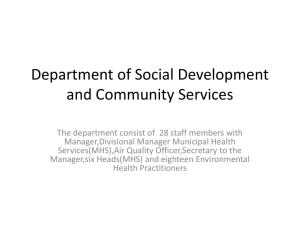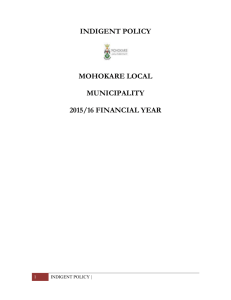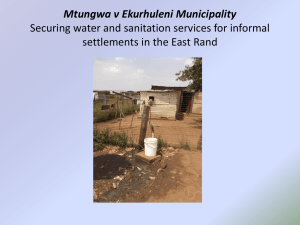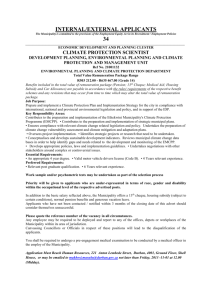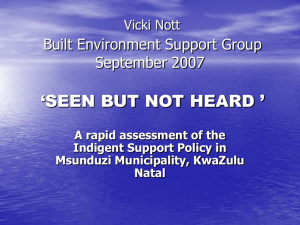indigent - Thaba Chweu Municipality
advertisement
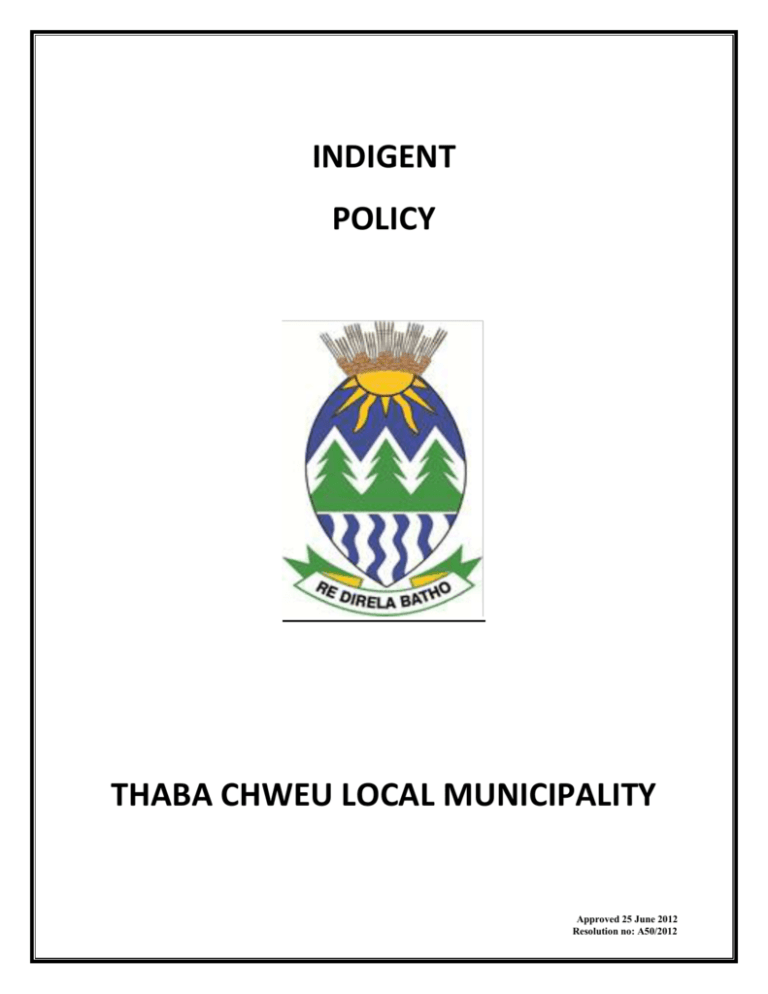
INDIGENT POLICY THABA CHWEU LOCAL MUNICIPALITY Approved 25 June 2012 Resolution no: A50/2012 TABLE OF CONTENTS Page 1. Definitions ------------------------------------------------------------------------ 3 2. Principles ------------------------------------------------------------------------- 4 3. Criteria ------------------------------------------------------------------------- 4 4. Registration Documents ------------------------------------------------------------------------ 4 5. Electricity ----------------------------------------------------------------------- 5 6. Water ----------------------------------------------------------------------- 6 7. Assessment Rates ------------------------------------------------------------------------ 6 8. Refuse ---------------------------------------------------------------- 6 9. Sewerage ---------------------------------------------------------------- 6 10. Limitations ---------------------------------------------------------------- 6 11. Re-evaluations ----------------------------------------------------------------- 6 12. Child headed households --------------------------------------------------------- 7 Approved 25 June 2012 Resolution no: A50/2012 INDIGENT DEBTORS AND CHILD-HEADED HOUSEHOLDS 1. Definitions In this policy, unless the context indicates otherwise – “chief financial officer” means a person designated in terms of section 80(2)(a) of the Municipal Finance Management Act “the municipality” means Thaba Chweu Municipality “arrears” in respect of an amount, means an amount that remains unpaid after the due date; “child-headed household” means a household consisting only of persons younger than 18 years, irrespective of the number of persons constituting it, which ordinarily resides within the Municipality without an adult person living with such household, irrespective whether such adult person is a relative of the other members of the household concerned; “consumer” includes a rate-payer; “consumer account” includes a rates account; “debtor” in relation to the Municipality means any person owing money to the Municipality regardless of the reason for the debt arising; “default” includes making only a partial payment of the amount indicated on a consumer account issued by the Municipality; “due date” in relation to an account, means the date stipulated on the relevant account ; “overdue” in respect of an amount, means an amount that remains unpaid after the due date; “property” means immovable property registered in the name of a person, including, in the case of a sectional title scheme, a sectional title unit registered in the name of a person; and “Systems Act” means the Local Government: Municipal Systems Act 2000 (Act No 32 of 2000). Approved 25 June 2012 Resolution no: A50/2012 2. Principles a) All indigent persons should have access to basic services in terms of the South African Constitution. b) The level of affordability by Council for the supply of free basic services should be determined. c) The escalation of debt on accounts of consumers not in a position to pay should be prevented. d) The level of utilization of consumer services for people who cannot afford to pay should be . restricted. e) The access of consumers to free basic services should be regulated. 3. CRITERIA A debtor who meets the criteria contained in the paragraph below may apply to be registered as indigent. The following conditions should be met in order to qualify to be registered: (a) The applicant must be a natural adult person. (b) The gross total monthly household income of all persons ordinarily residing at the premises concerned from all sources may not exceed an amount of R2 500 as may be determined by the council from time to time. (c) The applicant may not own, either on her/his own or together with other persons, more than one fixed property. (d) The applicant must ordinarily reside at the premises concerned. (e) The amount written off will be reinstated should the owner sell the propery. 4. REGISTRATION DOCUMENTS An application in terms of this paragraph shall be made on the prescribed application form and shall be accompanied by – Approved 25 June 2012 Resolution no: A50/2012 (a) a sworn affidavit stating the gross total monthly household income of all persons ordinarily residing at the address concerned; (b) the applicant’s latest pay slip, if she/he is employed and the latest pay slips of any other persons ordinarily residing on the property concerned who are employed; (c) a certified copy of the applicant’s identity document; and certified copies of all persons above eighteen years who ordinarily reside at the address concerned. (d) a certificate issued by the applicant’s ward councilor that the applicant is entitled to be registered as indigent. (e) A letter of appointment (authority) obtained from the court in case where the owner of the Property is deceased (f) (g) Verification form signed or issued by the Department of Labour An indigent debtor must immediately request de-registration if his/her circumstances have Changed to the extent that she or he no longer complies with the requirement set out in the definitions. 2.2 A completed application, together with the certificate issued by the ward councilor concerned and other documents required, must be handed in at any office of the Municipality. 2.3 Upon receipt and approval of an application form enlisted consumers will qualify for the following services levels – 5. Electricity Residential Consumers with electricity supplied by the Municipality will receive the first 50 kwh units free each month. Approved 25 June 2012 Resolution no: A50/2012 All registered indigent debtors MUST be on a prepaid electricity meter 6. Water Residential Consumers with water supplied by the Municipality will receive the first 6 Kl free each month. If a debtor uses more than the total free water allocated and does not pay for the additional water by the due date (normally the 7th of each month), the water supply may be restricted, and will remain restricted until the account is paid in full or reasonable payment is received and an arrangement is made in line with the Credit Control and Debt Collection Policy 7. Assessment Rates The first 15 000 of the property value of residential households is exempted from tax. Registered indigents will get a 50% rebate on assessment rates. 8. Refuse Removal The indigent debtor will be granted a rebate of 84% on refuse removal charged on the consumer account monthly, 9. Sewerage The indigent debtor will be granted a rebate of 84% on sewerage charged on the consumer account monthly, 10. Limitations The above free issues and discounts are based on the expected equitable Share to be paid to Council by National Treasury annually. The annual adjustment to these benefits is subject to the increase in the Equitable Share 11. Re-evaluation (a) Should an applicant in his application present any fraudulent statement he/she will be denied approval or, if already been approved, will immediately be deregistered. Approved 25 June 2012 Resolution no: A50/2012 He/she will be held responsible for any monies written off and will repay all benefits received at the discounted rates. (b) The Chief Financial Officer may refuse to register a consumer as indigent if that consumer at any time during the 12 months immediately preceding her/his application was removed from the indigent register (c) In the event of the death of an indigent debtor a relative or an adult member of the household of the deceased must provide a certified copy of the death certificate in respect of the debtor issued in terms of section 22 of the Births and Deaths Registration Act 1992 (Act No 51 of 1992) to the Municipality (d) When a debtor is registered as indigent the debt of the consumer existing on the day of registration shall be parked and such a person’s name be given through to the credit bureau. The Chief Financial Officer shall as often as is necessary report to the Municipal Manager regarding any debts parked in terms of this paragraph, and may recommend that such debts be written off. (e) That if a person who was or who is enlisted as indigent sell his property, the arrears written-off will have to be paid before a clearance certificate can be issued. (f) Interest shall not be charged on arrear charges owing by indigent debtors. 12. CHILD-HEADED HOUSEHOLDS 12.1 Whenever the ward councilor has reason to believe that premises are occupied by a childheaded household (regardless whether municipal services are supplied to such premises), she/he shall make such enquiries, which may include inspecting the premises concerned, as she/he may deem necessary to establish the facts. 12.2 If the belief of the councilor is confirmed, she/he shall forthwith in writing report the matter to the relevant authority responsible for child welfare and thereafter to the Chief Financial Officer. 12.3 The Chief Financial Officer shall, when she/he receives a report that a child-headed household Approved 25 June 2012 Resolution no: A50/2012 occupies premises within the Municipality, immediately – (a) delete the particulars, if any, of any indigent debtor in respect of the premises concerned from the indigent register; (b) immediately in writing request the relevant department to restrict the supply of any services to the premises to the service levels applicable to indigents. 12.4 The departmental head concerned shall inform the Chief Financial Officer in writing of date on which services to premises have been restricted. The departmental heads shall thereafter take all reasonable steps to ensure that services remain restricted at the premises concerned until such time as a consumer agreement in respect of the premises is concluded with the Municipality. 12.5 If it is established on a balance of probabilities that the adult person(s) who previously occupied premises together with children – (i) (ii is dead and that her/his heir(s) is a child, the Municipal Manager may write the debt owing in respect of services supplied to the premises and rates off as irrecoverable; on receipt of a report from the authority responsible for child welfare, declare the child-headed household indigent. Approved 25 June 2012 Resolution no: A50/2012
